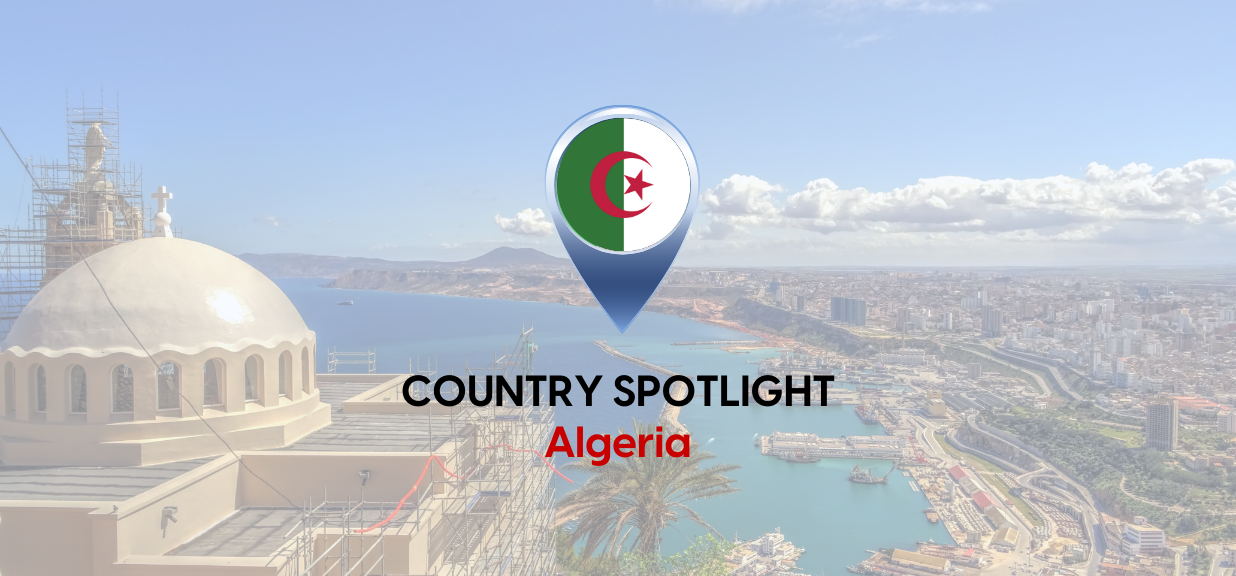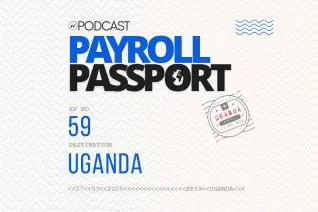Country Spotlight: Payroll in Algeria

Did you know that Algeria is home to seven UNESCO World Heritage sites, including the breathtaking "M'Zab Valley" with its unique, pentagonal desert cities? These ancient cities, built in the 11th century, showcase intricate urban planning and architecture that have stood the test of time. Much like these complex, well-designed cities, Algeria's payroll system is an intricate structure of regulations, cultural considerations, and modern business practices.
Algeria's payroll system plays a crucial role in the country's labor landscape. From minimum wage regulations to unique leave policies, every element must be carefully navigated to ensure compliance and smooth operations. And much like a visitor marveling at the M'Zab Valley's architecture, international businesses often find themselves in awe of the complexity and depth of Algeria's payroll requirements.
Timekeeping Mirage: Working Hours & Minimum Wage
In Algeria, the standard workweek is 40 hours, typically spread across five days. However, during the month of Ramadan, working hours are typically reduced to 36 per week. This annual shift presents a unique challenge for employers, requiring careful management of schedules and productivity. Overtime is permitted but limited to 20% of normal working time, adding another layer of complexity to time tracking and payroll calculations.
As of 2024, the minimum wage in Algeria is set at 20,000 DZD per month. This figure is subject to change, often in response to economic factors and government policies. Employers must stay vigilant to ensure compliance with these changes, as failure to meet minimum wage requirements can result in severe penalties.
For employers in Algeria, tracking working hours accurately, especially during Ramadan and for overtime calculations, can be a complex task. Implementing a robust time-tracking solution can help automate this process, ensuring accurate records and compliance with Algerian labor laws. Such a system can be configured to adapt to Ramadan hours, calculate overtime correctly, and flag any potential minimum wage violations.
YOU MAY ALSO BE INTERESTED IN I Neeyamo and Oracle talk Partnership, Growth & Innovation
Fair Warning: Navigating Notice Periods in Algeria
The notice period for termination of employment in Algeria is typically defined in the employment contract, reflecting the importance of these agreements in Algerian labor law. However, the law sets minimum standards that cannot be evaded:
- For workers and employees: The minimum notice period is one month.
- For supervisors: At least three months' notice.
- For executives: Minimum of six months notice.
For fixed-term contracts lasting more than 12 months, employers must provide a notice period equivalent to one month per year of service, up to a maximum of 12 months. This graduated system recognizes the increased investment and dependency that develops in longer-term employment relationships.
These varying notice periods present a significant challenge for employers in Algeria. Managing different notice periods for various employee categories and contract types can be complicated and time-consuming. It requires careful tracking of employee classifications, contract durations, and years of service. Mistakes in calculating notice periods can lead to legal disputes and financial liabilities.
To address this challenge, employers can benefit from an advanced HR management system. Such a system can help track employee categories, contract types, and years of service, automatically calculating the correct notice period when needed. This ensures compliance with Algerian labor laws and reduces the risk of disputes.
Taking a Break: Understanding Algerian Leave Entitlements
Algerian labor law provides for various types of leave:
- Annual Leave: Employees in Algeria are entitled to 30 days of paid annual leave after one year of service.
- Maternity Leave: Female employees receive 14 weeks of maternity leave.
- Sick Leave: Employees are entitled to 15 days of sick leave, which will be received in half the wages for the first 15 days and in full wage from the 16th day onwards or if the employee is admitted to the hospital before that.
Managing these different types of leave, especially for a large workforce, can be complex and prone to errors. It requires tracking multiple variables, including employment duration, leave balances, and specific circumstances such as pregnancy or illness.
Implementing a comprehensive absence management system can automate leave calculations, track balances, and ensure compliance with Algerian regulations. This not only reduces the administrative burden but also helps maintain employee satisfaction by ensuring accurate leave entitlements and timely approvals.
ALSO READ I Mastering Data Synchronization: Key to Streamlined Payroll Operations

Navigating the Dunes: Labor Laws & Taxes
Algerian labor laws are comprehensive and strictly enforced. All employment relationships must be formalized through written contracts, clearly stating the terms of employment. These contracts are crucial for resolving potential disputes.
Social security is mandatory, with both employers and employees contributing to cover health insurance, pensions, and unemployment benefits. Contribution rates may vary, requiring vigilant management.
Collective bargaining is recognized under Algerian law, allowing unions to negotiate wages and working conditions. This adds complexity to employment relationships and payroll management.
Taxation follows a progressive system, with personal income tax rates ranging from 0% to 35%. Employers are responsible for withholding and remitting these taxes, adding another layer of complexity to payroll processes.
Staying compliant with these intricate labor laws and tax regulations is challenging. It demands a deep understanding of local regulations, constant monitoring of changes, and meticulous record-keeping. Employers can benefit from comprehensive payroll solutions designed to handle these complexities, ensuring compliance and avoiding penalties.
Mastering Algerian Payroll: A Final Checklist
While managing payroll in Algeria may seem as challenging as crossing the Sahara, with the right tools and expertise, it can be navigated successfully. The unique aspects of Algerian labor law, from complex leave entitlements to strict contract requirements, demand a sophisticated approach to payroll and HR management.
By partnering with a global payroll provider experienced in Algerian regulations, like Neeyamo, businesses can turn these challenges into opportunities. Such a partnership can ensure compliance with Algerian regulations, streamline payroll processes, and allow companies to focus on growing their business in this vibrant market.
From accurate time tracking and leave management to complex tax calculations and compliance reporting, a comprehensive suite of HR and payroll solutions can help you master the intricacies of Algerian payroll. These tools can adapt to the unique aspects of Algerian employment, such as Ramadan working hours and graduated notice periods, while also providing valuable insights into workforce management and labor costs.
Don't let payroll complexities hold you back from tapping into Algeria's potential. With the right support, you can navigate the Algerian payroll landscape with confidence and ease, ensuring that your business not only complies with local regulations but thrives in this exciting market.
Latest Resources
Stay informed with latest updates
If you're curious and have a thirst for knowledge pertaining to the HR, payroll, and EOR universe, don't miss out on subscribing to our resources.
















